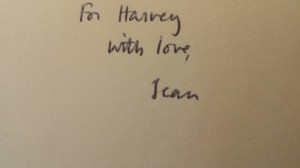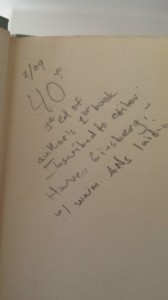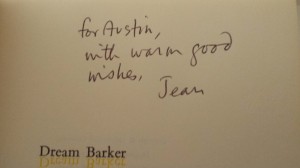I was particularly drawn to the selections from the Imperial University assigned for tomorrow’s discussion, and not just for the Saidian references of which we all know I am especially fond. I was engrossed in Nicholas de Genova’s account of what seemed to be the malignant misappropriation/misinterpretation of his speech against the U.S. invasion of Iraq for its exploration of the harmful rhetoric employed by his fellow faculty members and administrators, rhetoric which insidiously suppressed him as a member of the faculty. I was simultaneously impressed with and sickened by the way in which Lee Bollinger was able to both advocate for the tolerance of both freedom of speech and academic freedom while simultaneously impressing upon faculty and students, through coded language, that “both the form and the substance of [de Genova’s] speech commanded vociferous condemnation”. I am unsure how these principles of freedom are able to coexist with a flagrant disregard of them, and an insistence that there exist situations in which academics can be seen to be “crossing the line” – in an environment that truly advocates for academic freedom, should there really be a line to cross? I am further unnerved by de Genova’s insistence that “widely publicized allegations of ‘sedition’ or ‘economic heresy,’ which are perceived to diminish the value of the university’s commodity and to degrade the institution’s corporate credibility and respectability, are deemed infinitely more consequential than sustaining a space of genuinely uninhibited, robust, and wide-open freedom of speech and expression.” What, then, is the value of the university as a space of knowledge production and inquiry, if that very inquiry is limited instead to inquiry that doesn’t disrupt the hegemonic status quo, or engage problematic issues of U.S. foreign policy, or make social justice a priority of the academic sphere, but rather only pays lip service to these ideals? As a postcolonial scholar, the details of Bollinger’s commencement speech, in which he “unreservedly upheld the notion of U.S. global hegemony as [the graduating students] special responsibility,” do not sit well with me. If that is my special responsibility going forth, I, for one, want nothing to do with it. I am further unnerved by the idea that “the feelings we have that I have called familial, and that live in an extended orbit…including soldiers that fight on the nation’s behalf, often class with the seemingly abstract values and principles we also embrace for social and other purposes.” I feel Bollinger here is implying that such familial feelings are to be extended only within the bounds of nationhood, and therefore that such abstract values as “freedom of speech” and “social justice” exist only when they fall within the circle of the family of the nation. That makes me uncomfortable. As de Genova asks, “why indeed were these officials of the imperial university not more appalled and outraged by the real atrocities that the United States war machine was perpetrating against innocent civilians in Afghanistan and Iraq than the violent imagery [he] conjured with [his] words?” Why, indeed.
I am further interested in the way in which de Genova was punished for his incendiary words through a culture of censure rather than censorship, thereby divesting the university of any real responsibility or accountability for disciplining him. As he notes, “when I violated the tacit terms of that academic covenant – which pervasively encourages scholars to speak and write in disguised, Aesopian, obfuscatory language and exalts the exchange value of apparently sophisticated esoteric complexity – the penalty was not overt official sanction but instead a concerted silencing that could be enforced only through the multifarious manifestations of political disapprobation and professional disregard.” In this way, the institution itself was able to navigate the murky waters of public opinion, paying lip service, as I said, to the ideals of freedom of speech and academic freedom, placating faculty and students who disagreed with punishing de Genova overtly for his speech, but also ensuring that he did receive a form of punishment regardless of its comments to the contrary, through manipulating the culture of the university to exclude him and denying him tenure, thereby simultaneously placating the efforts of, for example, the 104 or so members of Congress that demanded he be dealt with in some way or another.
Insidious manipulation aside, attempts such as these to quash what appears to be overtly political dissent, or whatever you’d like to call it, bring to mind several current debates within postcolonial studies, namely that “the ‘linguistic turn’ and ‘descent into discourse’ in postcolonial studies risk obscuring the material coordinates of imperialism, and depoliticizing a field of study that is from its inception engaged with inherently political questions of empire, race, colonialism, and their relationship to cultural production” as Helen Scott writes in her Caribbean Woman Writers and Globalization. I am concerned with the institutionalization of this subfield into the discipline of literary studies, worried that it will lose it’s edge, soften its radicalism in order to conform to the expectations of the academy so as to be conducive with the process of evaluating candidates for tenure, a process that seems to insist that scholars conform to the existing status quo rather than interrogating it. I wonder, as well, if this speaks to the fact that postcolonial theory largely refuses to engage with the status of the United States as a postcolony despite the fact that many seminal texts of postcolonial theory (Frantz Fanon’s Wretched of the Earth comes to mind here, for example) are directly applicable to the history of independence and neoimperialism in the US. Instead, however, postcolonialists have chosen to engage with globalization, leaving the myth of nationality behind as an obsolete concept, much to my dismay. As Rob Nixon notes in Slow Violence, “together, the rise of world literary studies and the rise of the pro-globalization public intellectual have allowed many universities to phase out (or greatly reduce) their hiring and course offerings in postcolonial studies as a purportedly superannuated field. This would concern [him – and me!] less if [he] did not suspect this as being symptomatic of a broader scaling back within the humanities and the social sciences of the kind of radicalism that anti-imperial and postcolonial work often enabled.”
Finally, at the risk of clambering up on my soapbox and preaching accessibility yet again, I would just like to make a nod to de Genova’s encoded stab at the inaccessibility of language in academia, his comment about the culture “which pervasively encourages scholars to speak and write in disguised, Aesopian, obfuscatory language and exalts the exchange value of apparently sophisticated esoteric complexity,” as this is a deep concern of mine within the postcolonial sphere as well. Rob Nixon (who, as an aside, seems particularly relevant to Steven Salaita’s chapter in the Imperial University, as well) is similarly discomfited by this trend, noting that “an involuted turn toward an abtruse prose accessible only to disciplinary initiates severed much postcolonial work from the public, communicative ambitions that, at its best, had provided much of the field’s anti-imperial dynamism.” It puts me in mind of questions I often find myself asking of postcolonial theorists when grappling with their work – who, exactly, is your audience? Who, exactly, are you pretending to liberate, when the fact of the matter is that even those of us who claim to be postcolonial scholars have trouble muddling through what you’re saying? Who is being served by this rhetoric? How can you consider yourself a public intellectual when the public finds you completely unintelligible? And if your mission is not to serve the postcolonial public, then what, exactly, is it?






